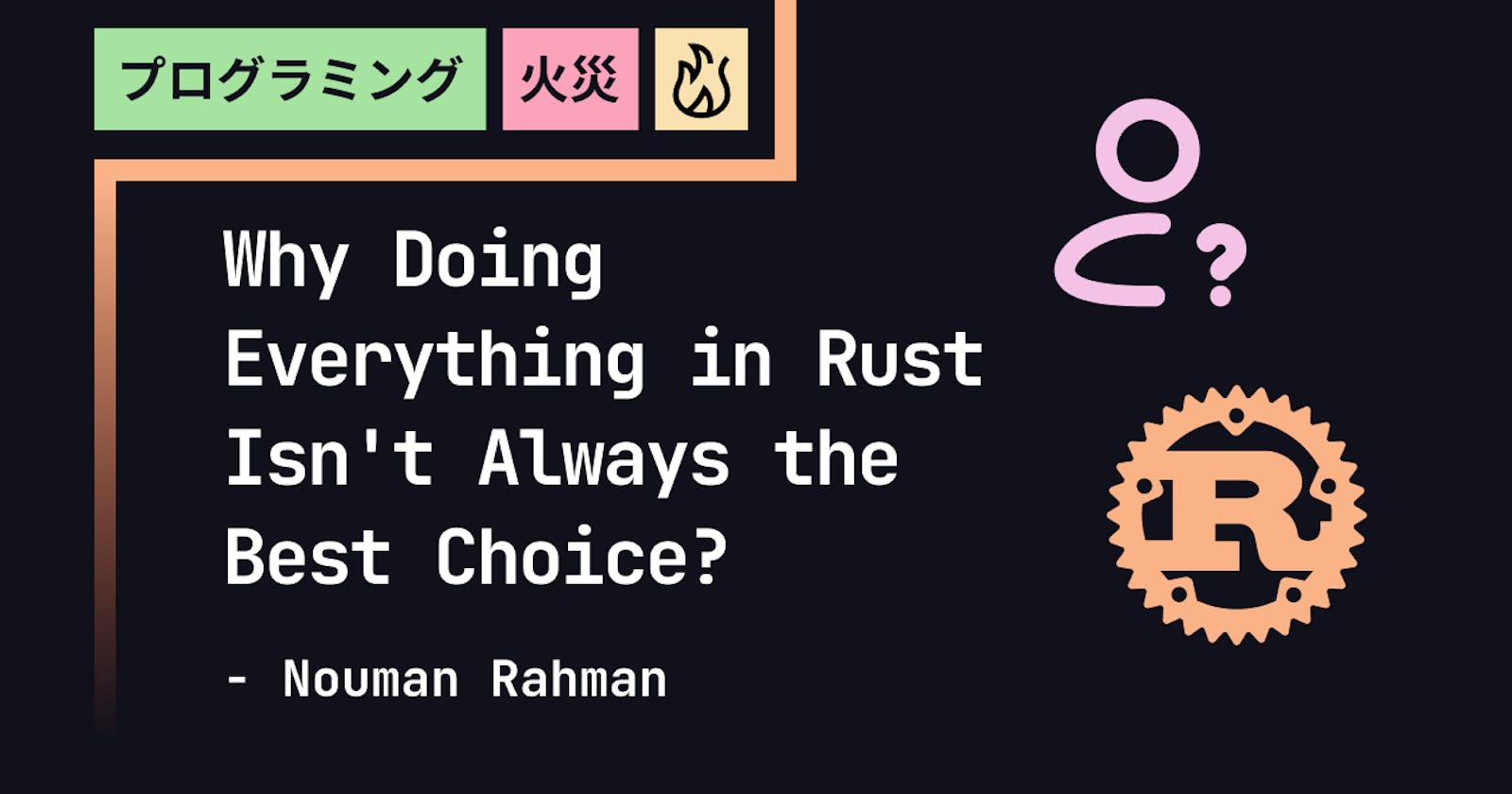Rust, with its growing popularity and remarkable features, has carved a niche for itself in the world of programming languages. It's praised for its memory safety, performance, and developer-friendly features. However, like any tool, using Rust for everything isn't always the best approach. In this article, I'll share my personal experience and explain why adopting a more balanced approach to language choice can be beneficial.
The Temptation of Rust
Rust's strengths are compelling. It offers a robust and safe way to manage memory, making it an ideal choice for systems programming, embedded systems, and performance-critical applications. The strong type system and compiler checks catch many bugs at compile time, reducing runtime errors. These qualities make Rust a fantastic language for projects where reliability and performance are paramount.
When Rust Shines
Systems Programming: Rust excels when you're developing low-level systems software. It's a safer alternative to languages like C and C++, thanks to features like ownership, borrowing, and lifetimes.
Concurrency: Rust's ownership system allows for efficient and safe concurrent programming. It's an excellent choice for building highly concurrent applications, especially when combined with libraries like Tokio.
Performance-Critical Applications: For applications where every ounce of performance matters, Rust's zero-cost abstractions and predictable runtime behavior make it an excellent choice.
The Pitfalls of Overcommitting to Rust
While Rust has many strengths, using it for every project can lead to some downsides:
Learning Curve
Rust's ownership system and borrowing rules have a steep learning curve, especially for newcomers. If your team isn't already proficient in Rust, it can slow down project onboarding and development.
Development Speed
While Rust's safety guarantees are valuable, they can sometimes slow down development. Writing code that adheres to Rust's borrow checker can be more time-consuming than in dynamically typed languages.
Limited Ecosystem
Rust's ecosystem is growing rapidly, but it's still not as mature or extensive as those of older languages like Python or JavaScript. Finding libraries or tools for niche tasks can be challenging.
Project Requirements
Not every project demands the level of control and memory safety that Rust provides. For smaller, less complex projects, the overhead of Rust's strict rules might not be justified.
Team Expertise
If your team doesn't have experienced Rust developers, the language choice might lead to frustration and slower development. Hiring experienced Rust developers can also be challenging.
Balancing Act: The Right Tool for the Job
In my experience, adopting a polyglot approach, where you choose the right language for the specific task, can be more efficient and pragmatic. Here are some considerations:
Project Scope
Evaluate the scope and complexity of your project. For small scripts, automation tasks, or prototyping, Python or Ruby might be more productive. Save Rust for the areas where its strengths shine.
Team Expertise
Consider your team's familiarity with the language. If everyone is well-versed in Rust, using it extensively makes sense. However, if your team has expertise in multiple languages, leverage that diversity.
Ecosystem and Libraries
Assess the availability of libraries and tools for your project's requirements. Some languages have extensive ecosystems with ready-made solutions for various tasks.
Development Speed
For rapid prototyping or short-lived projects, prioritize development speed over performance. Quick iterations and bug fixes might be more critical than the ultimate runtime efficiency.
Why We Shouldn't Use Rust for Everything
Maintaining a Balanced Perspective
While Rust is undeniably a powerful language with a bright future, using it for every project isn't always the best choice. Here are some reasons to exercise caution:
Learning Curve: Rust's learning curve can be steep, and it might not be the best choice for small, short-term projects or when you need to onboard new team members quickly.
Development Speed: Rust's emphasis on safety can sometimes slow down development, especially for tasks that don't require low-level control.
Resource Availability: In some domains, like web development, Rust's ecosystem and community support might not be as comprehensive as other languages like JavaScript or Python.
Team Expertise: If your team lacks Rust expertise, the time required to learn and apply the language effectively can impact project timelines and quality.
Conclusion
Rust is undeniably a powerful language with a bright future. Its emphasis on safety and performance makes it a valuable tool in a developer's arsenal. However, using Rust for everything isn't always the best choice. It's essential to strike a balance and choose the right language for the job, considering factors like project requirements, team expertise, and development speed. By doing so, you can harness the strengths of Rust while ensuring efficient and pragmatic software development.
